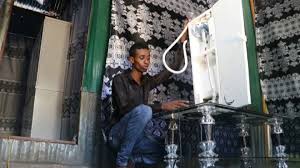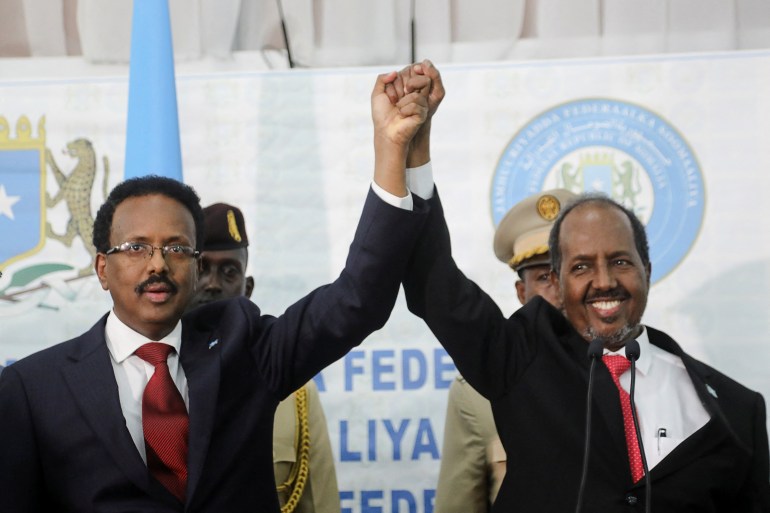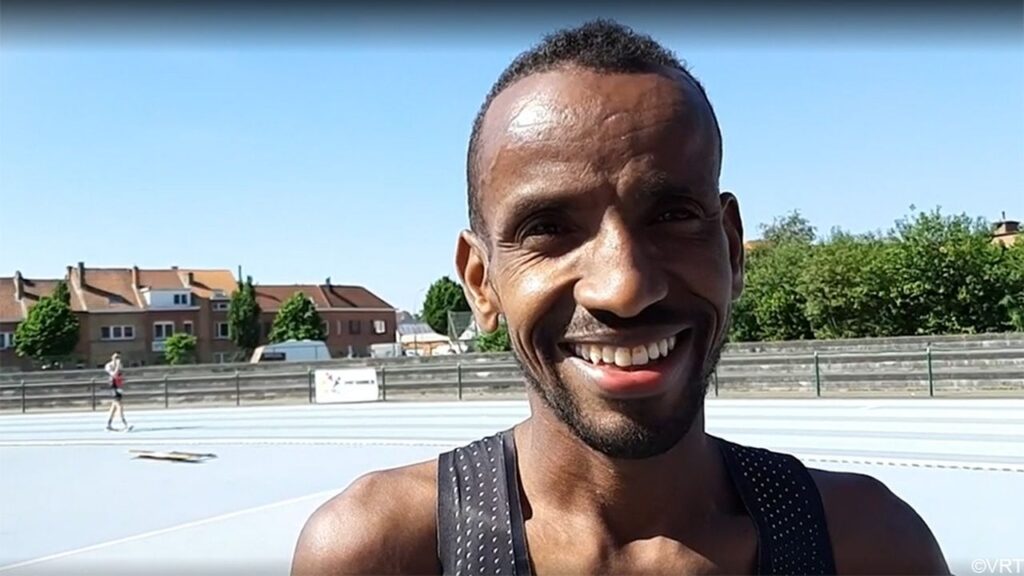Minneapolis poet Muna Abdulahi talks strategy, community and leveraging cultural stereotypes in Netflix’s season two of “The Mole,” where she competed for a $154,000 prize.
Who is the mole?
For Somali American poet Muna Abdulahi, that question loomed large during her first day on season two of Netflix’s reality game show, “The Mole,” which was filmed in the napier grass fields of western Malaysia. Abdulahi had to figure out who to trust among the other 11 players while aware that one of them might be secretly sabotaging the game, and while navigating cultural differences and working to stay under the radar herself during the six-week filming.
The premise of “The Mole” is simple: contestants work together to build a pot of prize money that only one player will win in the end. Among them is “the mole,” a player tasked with working against the group. After each mental or physical challenge, players take a quiz to identify the mole and the contestant with the lowest score is eliminated. If the mole remains undetected until the end, they win, but if the last player uncovers their identity, that player takes the prize.
In a game where everyone is out to deceive each other, moments of genuine connection feel like dangerous territory. Off-camera, players share meals, tell stories and laugh together — but beneath the camaraderie, the question remains: Who can you trust when everyone might be lying?
Abdulahi, who grew up in Willmar, Minnesota, and now lives in Minneapolis, approached the game with a calculated strategy: lean into being underestimated.
“When people first meet me, they see the hijab,” Abdulahi said in a confessional in the first episode. “They see a Muslim woman, somebody who follows other people’s orders, and I’m going to use that to every single advantage.”
Did Abdulahi’s strategy pay off? Watch “The Mole” on Netflix to see how far she goes.
In an interview with Sahan Journal, Abdulahi reflected on her life as a poet and shared her experience filming the show in July 2023. She discussed what it was like being a Muslim woman in a high-stakes competition balancing trust and suspicion.
The interview has been edited for length and clarity.
Can you share a bit about your journey as a poet in the Twin Cities? What inspired you to start writing?
I started writing poetry when I was 14. Somalia is known as the nation of poets, so I have family members who are poets, like my grandmother. Being born and raised in the U.S., language was still a barrier because I understood Somali when it was spoken to me but speaking it was a whole other conversation. So, when I was young, there was a part of me that really wanted to find something that connected me to my culture and poetry was it.
The issue was, I went to predominantly white schools my whole entire life, so a lot of the authors I would read would be old white men. I’m like, “Okay, I have absolutely no ties to these people,” but then I started getting into spoken word poetry and that scene is predominantly BIPOC stories and narratives that I never got to hear growing up. It inspired me to write, and I just never stopped.
How do your experiences as a Muslim woman influence the subjects you write about?
That’s a really good question. I mean, I think everything ties back to our inner child. For me, I never really got to hear BIPOC stories. I still remember the first BIPOC story I read. It was “The Kite Runner.”
I think when you are not represented in stories, it makes you feel unimportant and as if your experiences are not worthy of being shared. It’s also the media in general. So, my mission when I started writing was to not only give space to our stories, but to give space to the stories that were devalued or silenced or not seen as worthy.
It feels like there’s two sides of the coin — either our stories are not being shared or, when it is, it’s these perfect stories where Black and brown girls become tokenized and don’t feel worthy unless they’re exceptional. I want to give space to the in-between.
What drew you to “The Mole”? How did you get involved with the show?
I’m a big, big fan of reality TV, specifically reality competition shows like “Big Brother” and “Survivor,” so I’ve always wanted to be a part of it, but I never saw any Muslim people. I remember writing down in my notebook the shows that I want to be a part of, and I had to check off every single one because the structure of the game itself would not meet the necessities and the needs of being a Muslim woman.
In “Survivor,” you’re stranded on this random island and — let’s say you just did a swimming challenge — you’re going to be wet all day, all night. Maybe you have an extra hijab but how would you be able to preserve your values and at the same time play this game?
It’s the same thing with “Big Brother,” where you’re being filmed 24/7, even when you shower. Even though I love the game, I can’t really do it. What I loved about “The Mole” is that the structure of the game itself is accessible to Muslim women.
What was it like communicating with producers about what you needed?
So the first thing is prayers. We pray five times a day. The way that these games work is completely fast-paced, so I basically had to tell them, “Hey, I need 10 minutes.” We met in the middle where I was able to move to the side and do my prayers, but that also meant that I was praying in a lot of different places.
We also didn’t have our phones, but I usually use it to pray at specific times and toward a specific direction to Mecca. I also needed water to make wudu (a cleansing ritual), so there was somebody who literally carried my prayer mat, bottled water and checked the times for me. That was really helpful. It also helped that we were in a Muslim country. There were a lot of prayer rooms already within the city.
How did you mentally and physically prepare for the show?
I rewatched a lot of the seasons, and not just the U.S. seasons. I’m also a big fan of the international seasons, so I was watching Netherlands, Belgium and Australia. I wanted to make sure that my game plan was set, but at the same time give myself room to adapt, because that’s the name of the game.
We don’t really know what we’re getting into. I also prepared by memorizing things, because the objective of the game is, “Who is the mole,” right? We have to remember as much as possible about them: What are they wearing? What color are their shoes? Which car did they get in?
Those little details would be on the quiz.
What was your strategy going into the game?
Originally, my strategy was to play into this stereotype that people have for Muslim women — very timid, shy, quiet, observational, not taking up too much space — so they underestimate me. It worked for that first episode but after that, I had to switch up my game.
I can’t hide. It’s so much more difficult to hide who you are when you’re with these people all day, but it still worked to my advantage because people still underestimated me. Well, until mid-game when you see them start to question if I was the mole.
In the first episode, you talked about how people often perceive Muslim women as obedient or timid. As you entered the game and interacted with contestants, did you feel that they had a specific perception of you?
Off the bat, yeah. It was exactly what I thought. I don’t think a lot of people on the show had close Muslim women friends, so I think a lot of the time, people perceive groups of people based on what they see on TV.
I remember Q [Quaylyn Carter] was like, “Oh my gosh, I thought you were going to be so quiet,” so, I really could have played into that. But Andy (Mintzer) had a lot of knowledge about Muslim culture. Muslim women and men are not supposed to touch the opposite gender’s hand, so I knew that first meeting was going to be so awkward because a lot of people don’t know that, but Andy knew right away.
How did you manage building friendships with contestants while, in the back of your mind, knowing that one of them is sabotaging the game?
To be honest, I came in there like, “I’m not here for friends; I’m here to win,” but a lot of these people are just so likable and so lovely. The mole lies throughout the whole thing, but off-camera, the stress and tension is gone. We’re eating together or driving to the next location and sharing stories about who we are.
The core of me is centered around community, and even though I wanted to shut it off, those in-between moments really got to me. Some of these friendships are so real. Hannah (Burns), for example, was somebody who I saw as competition or as an enemy, but outside of the game, we were friends, so it was this weird, funny tension where it’s like, “I adore you, but in the game, I’m lying to you up and down.”
I had such a beautiful friendship with Jenn (Jennifer Dasilva-Hassiman), too, and it sucked so bad because she left first. She has such a beautiful spirit. In the beginning, it was difficult coming into this as a minority.
I know who I am, but I’m also shifting myself a little bit for this game, and as someone who grew up in predominantly white spaces, code switching becomes this mechanism. It was lovely to see Jenn be exactly who she is — this bold, beautiful personality and unapologetically herself.
One of the key moments from the season was episode five, when you guys had an auction and contestant Neesh Riaz bid the entire pot of $59,500 for an exemption from the quiz.
What was it like watching all of that money you guys worked for drain from the pot?
It was so tense, and it’s funny watching it back from an outside perspective, because it’s been so long. I’m just laughing at my reaction, because it was so serious. What’s so unique about this game is that they take your phone away so you’re truly, one-hundred percent engulfed in this experience. Like, this is your life, and we’re at the halfway point.
When he took all that money, it just hit me that somebody’s full year of work was gone just like that.
Honestly, everybody was so mad. There’s so many moments that were not shown. We were outside and we were just like, “What are we doing here?” Even the host had to remind us that there’s still a lot of money coming in, but I think at this point, people were just so tired of losing money and you’re realizing not only are we competing against the mole, we’re competing against other players. So you’re like, “Okay, what are my actual odds here? If I was to win, am I going to be winning a dollar? Is that right?”
How did it feel to get as far as you did?
It felt so good. A big part of that whole experience ties to the very beginning of our conversation where I didn’t want to come on the show to prove that I’m smart or exceptional. I just wanted to be myself and show all of the complexities that make up a human.
I’m smart, but I’m also a big personality. I’m a little funny and a little quirky. I don’t have to compromise anything and I can still get to the end. Even though I didn’t win, I still proved that it had nothing to do with who I was or my capabilities and, for that, I feel like my purpose was met. Money would have been amazing but the experience was more fulfilling than I could have imagined.
What was the reaction from your friends and family after the show aired?
It was really beautiful. My family is my biggest support system and my sisters, especially. It was like a sports game, the way they were cheering for me.
What about the response from viewers?
Watching the show back was such a healing experience, and then to see the outpour of love in my DMs — that was something I wasn’t prepared for. And to see all these Muslim women come into my messages — it meant so much to me, and I didn’t know how much I needed it.
It just reaffirmed exactly what I was meant to do. Coming into this next era, I want to continue paving the path so others could walk with me and hopefully, it’ll be easier for the next one, and the next one, and the next one.
source/content: sahanjournal.com / myahgoff (headline edited)
_____________

Poet Muna Abdulahi (center) gives a spoken word tribute during the January 9, 2024, inauguration of St. Paul’s historic all-female City Council. The new council sits behind her. Credit: Aaron Nesheim | Sahan Journal
________________________
AMERICAN / SOMALIA






